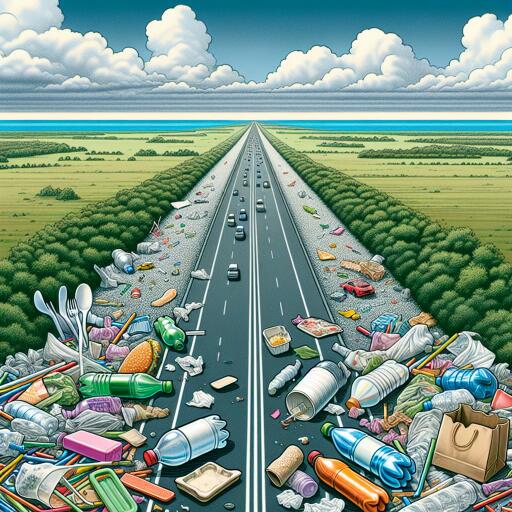
Highways Becoming Landfills: The Environmental Crisis of Plastic Pollution
Once praised for their engineering and as milestones of human progress, some highways are now being overshadowed by the burgeoning crisis of plastic pollution. A striking example of this environmental quandary is the once scenic Bengaluru-Mangaluru highway. The beauty of this route is now being marred by the rampant spread of plastic waste, turning it into a disheartening spectacle of neglect and environment degradation.
The issue is not just cosmetic. Plastic debris scattered along the highway, especially during windy days, poses a severe risk to motorists. The danger ranges from minor inconveniences to potentially life-threatening accidents.
Specific points along this highway, such as Nelamangala and the regions around Thippasandra, have become notorious for the accumulation of this waste. Both travellers and local residents contribute to this problem, with the latter occasionally using the roadside as an unofficial dump. A significant part of the litter consists of single-use plastic items related to liquor consumption, exacerbated by the number of bars located along the highway. Despite the presence of laws banning single-use plastics and regulating plastic production, the implementation seems lackluster at best, allowing the problem to persist and grow.
Concerned citizens and local activists are now raising their voices, demanding stricter enforcement of laws to curb the illegal sale of liquor in plastic sachets and cups, which significantly contributes to the waste issue. Government officials have promised action, pledging to inspect and clean up the most affected areas, and to enforce regulations against the use of disposables in government offices.
Environmental activists highlight the larger picture, reminding us that plastic pollution is not just a local but a global catastrophe in the making. Discarded plastics, littering highways and natural landscapes alike, pose a grave threat to ecosystems, wildlife, and human health. Plastics, through a slow degradation process, release hazardous chemicals into our environment, contaminating soil and water sources, and endangering diverse forms of life.
The problem extends beyond visible pollution. As plastics breakdown into microplastics, they integrate into the food chain, affecting organisms at all levels, including humans. These microplastics serve as carriers for toxic chemicals, which can end up in our bodies, posing various health risks.
The discourse around plastic pollution also intertwines with the broader issue of climate change. The production, incineration, and degradation of plastics emit greenhouse gases, exacerbating the climate crisis. The reliance on fossil fuels for plastic production further amplifies these environmental impacts, highlighting the urgency for systemic change towards sustainability.
Experts argue for a multifaceted approach to mitigate the plastic pollution crisis. Prioritizing waste reduction, championing sustainable alternatives, and enhancing waste management infrastructure are pivotal steps. Such actions require collective effort from governmental bodies, private sectors, and individuals. Together, it is possible to reign in the tide of plastic pollution, preserving our planet’s health and biodiversity for future generations.
In conclusion, the battle against plastic pollution extends beyond just cleaning up littered highways. It calls for a comprehensive shift in how we produce, consume, and dispose of plastics. By adopting more sustainable lifestyles and supporting eco-friendly policies, society can confront this global environmental challenge head-on, ensuring a cleaner, healthier world.





Leave a Reply